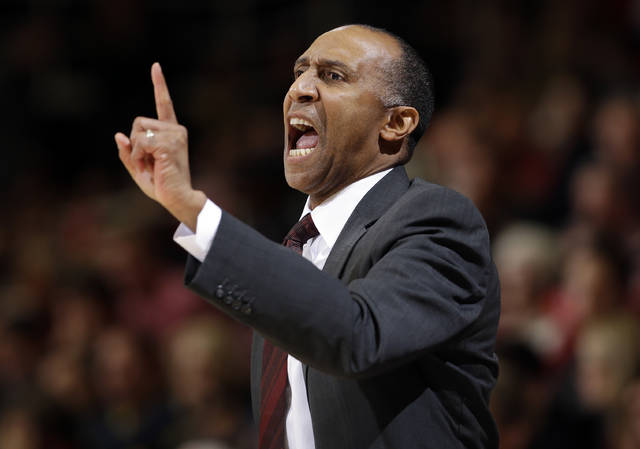ATLANTA — It’s easy enough to brush off the National Invitation Tournament as nothing more than a lame coronation: crowning a champion of the also-rans. ADVERTISING ATLANTA — It’s easy enough to brush off the National Invitation Tournament as nothing
ATLANTA — It’s easy enough to brush off the National Invitation Tournament as nothing more than a lame coronation: crowning a champion of the also-rans.
Just don’t try pushing that narrative on Josh Pastner and Georgia Tech, or any of the other three teams that will be at Madison Square Garden next week for Final Four Lite.
When it comes to building a program, the NIT can be an extremely useful tool.
“It’s a great stamp for the guys to know that we belong and how far we’ve come since the beginning of the year,” said Pastner, wrapping up a first season as the Yellow Jackets’ coach that went much better than anyone expected.
Of course, all four of these teams — Georgia Tech, TCU, Central Florida and Cal State Bakersfield — would’ve preferred to be in the NCAA Tournament. But, given the choice at what is better for the long-range development of his program, Pastner said he’ll take getting this far in the NIT over a one-and-done appearance in the Big Dance.
He wasn’t kidding, either.
“Just the ability to play in postseason, I think that’s important,” Pastner said. “Understanding what we need to do to get to the NCAA Tournament. We got more practice, more games. We’ve gotten a lot of good stuff out of it. We’ll be able to build on this as we get into the offseason.”
Indeed, each of the NIT finalists appears to be building toward something bigger:
— Georgia Tech (20-15) has plenty of history to fall back on, including two trips to the Final Four and former greats such as Mark Price, John Salley and Kenny Anderson. But the Yellow Jackets have been largely an afterthought since making it to the national championship game in 2004. They dumped two coaches (Paul Hewitt and Brian Gregory) while making only one NCAA appearance in the last decade. Enter Pastner, who guided his team to three stunning upsets (North Carolina, Florida State and Notre Dame) and earned coach of the year honors in the Atlantic Coast Conference.
— TCU, which hasn’t made the NCAA Tournament in nearly two decades, showed signs of becoming a force in the Big 12 under its first-year coach, Jamie Dixon. Even with a late-season slide that included four losses by a total of 10 points, the Horned Frogs (22-15) managed six conference wins — matching their total for the previous three seasons combined. Then, in the Big 12 Tournament, they knocked off then-No. 1 Kansas. With a young backcourt and all five starters expected back next season, this could be the start of something good in Fort Worth.
— Central Florida snapped a streak of three straight losing seasons under first-year coach Johnny Dawkins. At 24-11, the Knights are one off the school record for wins, though that’s not saying much for a program that’s never won an NCAA game and hasn’t even been to the big-boy tournament since 2005. But Dawkins could be on to something good in the talent-rich Sunshine State — especially after the success he had with only seven scholarship players. Fan support is building, too, evidenced by a record crowd of 10,011 that turned out for an NIT victory over Illinois. “It set the table perfectly for next year,” UCF athletic director Danny White said. “Johnny Dawkins is going to put a very competitive group on the floor. They are going to be fun to watch. They are going to play with passion.”
— Cal State Bakersfield (25-9) has only been a Division I member since 2006, but the Roadrunners have the potential to develop into a mid-major powerhouse. Last year, they reached the NCAA Tournament for the first time. This season, after playing respectably in road losses at Arizona and SMU and winning the Western Athletic Conference title, they were denied a return trip to the NCAAs by a defeat in the league tournament. Undeterred by that disappointment, the Roadrunners ripped off three straight road wins in the NIT, certainly earning their spot in the Big Apple.
Pastner was quick to point out a plethora of teams that used the NIT as a steppingstone to greater success.
Two of them reached this year’s NCAA Sweet 16: South Carolina and Florida.
Looking farther back, Baylor followed up its 2013 NIT championship with four straight NCAA appearances, twice reaching the round of 16. Wichita State won the NIT in 2011, sparking a run of six straight NCAA appearances that including a Final Four appearance in 2013 and 35 straight wins the following year. West Virginia followed up its NIT crown in 2007 with a trip to the NCAA regional semifinals the next season under Bob Huggins.
Pastner brings up his previous employer, Memphis, which won the NIT in John Calipari’s second year. The Tigers would go on to make the NCAA Tournament six of the next seven seasons, including a run to the national championship game in 2008.
Now, Georgia Tech wants to follow a similar path.
“When people think about Georgia Tech now, they think about a team that’s really fun to watch, a team that’s going to play hard, a team that’s going to play with high energy and give it their all,” freshman guard Josh Okogie said. “I think we started a solid foundation for years to come.”
Mock the NIT all you want.
These teams could wind up getting the last laugh.



